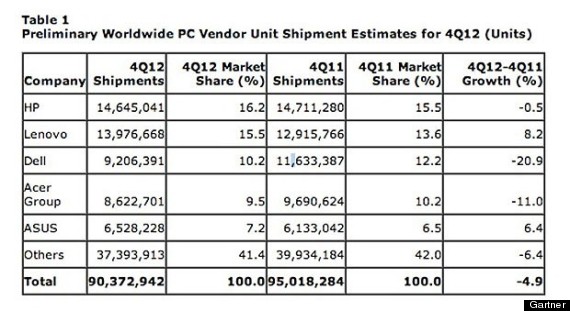
You’re forgiven if you haven’t thought much about Dell in a while. Not many people have. In fact, this past month has marked the first time in recent memory that the beleaguered computer-maker has been a significant part of any news cycle. After weeks of rumors, Dell announced on Tuesday that it would be going private, purchased by its founder Michael Dell in a $24.4 billion deal with financing help from Microsoft and four banks.
So why did Dell take Dell private? The company’s situation isn’t good -- even for a PC-maker -- and Michael Dell has decided the only way to save his legacy is to tighten control of his eponymous firm. Here are three charts that explain Dell’s dire straits:

Dell's stock price since 2007
This is the most straightforward reason for the buyout. Lately, Dell has done pretty terribly as a publicly traded company. Above, you can see the stock price drop since Michael Dell became CEO again in January 2007. Since he resumed his role as chief exec, the company's stock value has been cut in half, Bloomberg notes.
Such a stock slide brings scutiny from investors. Going private, on the other hand, allows the company to take steps like layoffs more easily, Gizmodo's Brian Barrett writes.
The stock price drop is one visible consequence of underlying trends: the decline of the PC business and the rise of smartphones and tablets. That's not news. But what might surprise casual observers is the particular beating Dell has taken:

Snapshot of PC sales in 2012
The statistics above, from the research firm Gartner, show why Dell is more willing than its competitors to take drastic measures. The company sold 2.4 million fewer computers during the last three months of 2012, compared to the last three months of 2011 -- and incredible 20.9 percent decrease. While the PC market has contracted 4.9 percent during that period, no other major PC-maker has come close to Dell's decline. Lenovo is up 8.2 percent, and HP is only down 0.5 percent (which is probably why the latter company felt fine making glib comments about Dell's buyout).
So Dell is itching to enter new businesses, a risk that's harder to take with Wall Street looking over its shoulder. Michael Dell has said he's into "pruning" his PC business for a while.
Quartz's Christopher Mims lays out an intriguing blueprint for the company: Basically, he says, Dell should make pocket-sized but fully powered computers that plug into monitors and process in the cloud. ZDNet's Jack Schofield thinks Dell can make money from PCs by selling them to companies and maintaining them as a service.
Those plans are oriented to selling to businesses, not people. That's probably a good thing for Dell, since the masses seem to have forgotten the brand:

Google Trends' results for Dell, Apple, Samsung and HP
Above, we can see how people have searched for Dell, in blue, and how they've searched for three of its biggest competitors since the mid-2000s. Interest in Dell has steadily declined, while searches for Apple (red) and Samsung (yellow) have jumped. Of course, a lot of that increased search activity is due to the iPhone, iPad and their Samsung-made cousins, not interest in those companies' PCs. But that's entirely the point.
